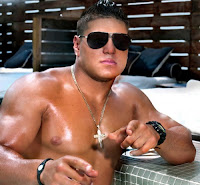

Johnny Bravo from Cartoon Network (left) vs. Ronnie from Jersey Shore (right)
Although he was voiced by a few different people over the course of production, Johnny Bravo’s voice was always an impersonation of Elvis Presley’s voice. His deep voice, connected with such a desirable pop culture icon as Elvis, added another dimension of masculinity for both younger and older viewers.
Aside from Johnny’s characteristics, his actions also helped create an image of a stereotypical “jock.” Each episode was centered on a different situation where Johnny Bravo was trying to get a girl. Johnny frequently went through extreme circumstances just for the chance of having a date. Many of the women he asks find him repulsive and begin beating him up.
This is a pretty interesting thing to think about for me. As a child, I certainly watched this cartoon as well as many others. However, I never was, am, or will be what is considered the stereotypical “jock.” I played baseball until the beginning of high school and the only mildly athletic “sport” I was in after that was marching band. Basically, I think the idea of the show helped form my opinion about guys who are “jocks” like Johnny Bravo. If Johnny Bravo was considered the epitome of masculinity, and such “masculine” (yet unintelligent) males were so repulsive to women, what was the point of being like Johnny Bravo if I was interested in women? Women in the show weren’t interested in narcissistic jerks, so what gave me reason to separate that from real life?
Before speculation occurs – I do not watch Jersey Shore.
I never saw this show, but from the way you described it, I have to agree with you; I don't see why anyone would want to be like Johnny. I mean, sure he looks "cool", but if he never gets what he wants? It makes no sense that little kids would want to be just like him.
ReplyDeleteI watched this show all the time, and it had a pretty similar effect on me as well. It made me think that striving to be as masculine and "jockish" as possible wouldn't give the results that other media objects might imply.
ReplyDelete